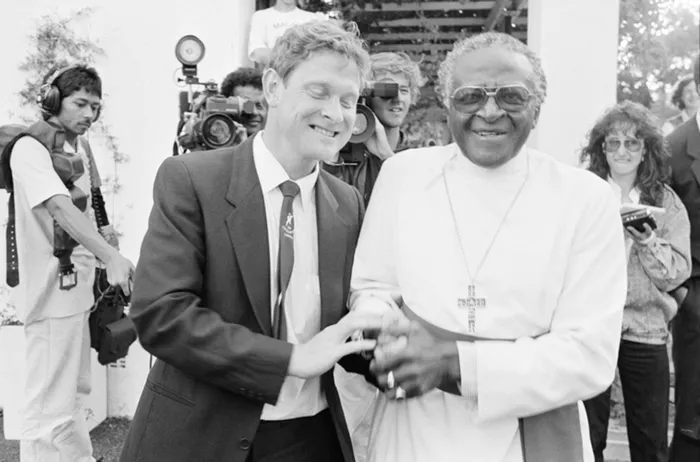Selfless white doctor deserves honour for apartheid sacrifices

Dr. Ivan Toms with Desmond Tutu, on his release from prison in Cape Town. Picture: UCT
Thembile Ndabeni
As a white man, Dr Ivan Toms was once part of the apartheid Death Force.
Not out of his choice – to them, as white males at the age of 18 it was like a ritual.
After the ritual was over, he went back to the former self, who he was, opposed to the apartheid system.
He withdrew from the killing machinery that was murdering people because of the colour of their skin inside and outside the borders of South Africa.
As a progressive medical doctor, he went to work in one of the poorest areas in the townships – Crossroads, an informal settlement. This poor community did not have access to a health facility. If it is a huge task for a doctor working under normal conditions, how much more was it in this poverty-stricken poor community?
It was not only the number of people, but the uneducated and poor, therefore there was a challenge of communication and effectiveness of medication. In most cases, medication requires that a person eat first.
Be that as it may, the clinic was opened. He was lucky to meet a colleague with a different cap from his, a man of the cloth, the Reverend David Russell.
Toms went further than being a doctor. The brutalities of the army in dealing with issues like forced removals in Crossroads strengthened his resolve never to be part of the army again.
As a result, he could not hide his opinions. Which is why he became the founder member and leader of the End Conscription Campaign (ECC).
Honouring a person for the role he played should not only be expected from the politicians/government. Yes, the politicians/government owe it to Toms, but it should not start and end with the politicians/government but with the community he served.
As much as it carries more weight when it is done by the politicians/ government than the community, he served the community.
Did the community of Crossroads do anything or enough to honour this selfless and courageous special soul, who rendered essential service they did not have?
It might not be the people who are there now, but the ones who were there and know him were supposed to be the ones who started and laid the groundwork. Then from there the best should have happened. That is, teaching and passing on the information about him from generation to generation.
Naming is good because it carries legacy, but teaching is necessary as the cherry on top of the cake. If not, then it does not carry much weight if the members of that community hear about him from outside and read from the library. The government honoured him with the Order of Baobab in Bronze. He would have been 70 on July 11.
The task is keeping Toms’s legacy alive and drawing lessons from his good work guided by his conduct, character and commitment.
Out of many things he did, among many that were outstanding,was saving the lives of the poor and neglected African people. Imagine, what would have happened to those lives if he did not go and establish a clinic in that neglected poverty-stricken community?
Being at the forefront in the formation of the ECC is not child’s play. It “sabotaged” the conscription to a certain extent. That manifested in some white youth refusing conscription.
It also added light and weight to international solidarity. His status (education: medical doctor) and colour (white) played a special role. Instead of enjoying privileges based on his education and colour, he voluntarily sacrificed, losing what he would have earned without being traumatised by that situation.
As a white person and a doctor, if he “complied” he would have earned what he deserved and enjoyed it comfortably.
It is not only always politicians who betray people who contributed or sacrificed, but ordinary people or communities as well. Ordinary people or communities must play their part and put pressure on politicians/ government when they fail.
Ndabeni is a former history tutor at UWC and a former teacher at Bulumko Senior Secondary School in Khayelitsha.
Cape Times